In the pantheon of great Stephen King movies, David Cronenberg's The Dead Zone is usually an automatic top 10 selection. So, why would I rather talk about the TV show?
Film nerd faux paux here, I know, but I sometimes struggle with older movies whose best parts have since been repeated ad nauseam in other films, TV shows, or even video games. For example, I saw Escape from New York for the first time two years ago and had a friend take me to task for offering a rather tepid endorsement of the John Carpenter classic.
My take: it's a bit disorienting to experience Escape from New York for the first time in 2017 when you've grown up playing the Metal Gear Solid video games featuring a Snake Plissken knock-off as the lead character and have seen countless other movies do the same basic plot. It's not that Escape from New York, by comparison, looks awful. It's more that I experienced it all in the wrong order, seeing all of the homages and rip-offs before the original article. As a result, Escape from New York doesn't so much blow my mind as it gets me to a place of "oh, now I see where everyone's been stealing from all this time." I'm more informed, sure, but I never had the opportunity to be surprised by the thing everyone copied.
Her counterpoint: does that mean I'd seriously argue on behalf of Joe Dante's Piranha if I happened to see it before Jaws? Or Friday the 13th over Halloween? A film's inherent greatness should not be impugned by the inevitable wave of imitators.
Touche. The fault is mine, not the movie, but that type of reverse-order viewing experience does lead me to certainly appreciate, but not necessarily love certain influential classics.
Case in point: The Dead Zone, a 1983 movie I just watched for the first time.
Critical Corner
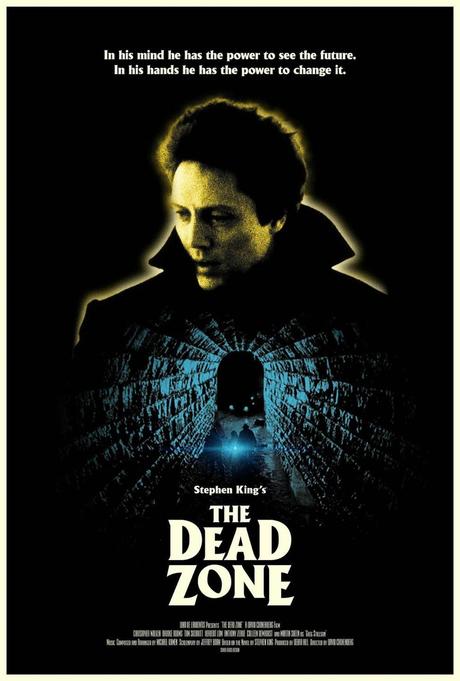
David Cronenberg's Take: "It is certainly the least offensive film I've made; the only one where grannies came out crying about the tragic love affair at the end."
Stephen King's Take: " The Dead Zone is Cronenberg's only really human movie...it is very warm and loving. The Dead Zone was a perfect marriage, like two flavors that shouldn't mix but did."
Where it Ranked on SciFiNow Magazine's Recent Stephen King Top 10: #5
What They Said:
"With a recent renewed interest given that it predicted America's current political situation, David Cronenberg's film manages to blend his chilly sensibility with King's signature heart to create something special. The moments of violence may come to mind first but there's a sensitivity to it too, embodied in a remarkable performance from Christopher Walken as tragic Johnny Smith, whose second chance at life and miraculous gift comes at a terrible cost. Brooke Adams is wonderful as Sarah, but Martin Sheen's smilin' psycho politician Greg Stillson is a grim reminder of King's ability to identify the danger in the ambitious."
The book came about as a writing challenge
Stephen King's first number one hardcover best seller and David Cronenberg's first mainstream American film, The Dead Zone has certainly been coming up a lot lately among King/horror/film aficionados who also happen to be mortified by the current political situation in the world.
Fun fact: King and Trump are almost exactly the same age - 72 and 73 respectively.
Less fun fact: Trump scares the bejesus out of King. Anyone who follows the author on Twitter already knows all about that. Fiction, however, has an odd knock for mirroring reality in the Trump era. As the New York Times put it, "Life is imitating Stephen King's art, and that scares him."
If life truly is turning into a Stephen King story, does this mean there's a school teacher-turned-psychic out there planning to assassinate Trump because he's foreseen a future in which the President leads us into nuclear armageddon? If so, is that lone gunman a hero? Or a villain?
How to make a lone gunman the hero: give him psychic powers.
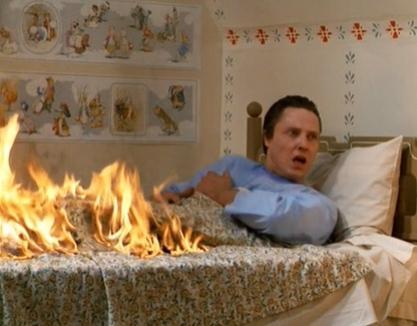
That kind of moral conundrum led King to write The Dead Zone back in 1979, a time when the Reagans, Bushs and Trumps and various other demagogues of the world had yet to torment the author's nightmares. As King revealed in his memoir On Writing, The Dead Zone was directly inspired by the following two questions: "Can a political assassin ever be right? And if he is, could you make him the protagonist of a novel? The good guy?"
Thus, King laid out a dual narrative about Greg Stillson, a bible salesman turned politician riding a populist wave to power and Johnny Smith, an everyman school teacher who awakes from a 5-year coma with a renewed ability to see the future through touch. (The eventual film excised the prologue establishing Johnny's psychic ability actually first presented itself after a childhood accident but went away just as instantly as it came and was thus quickly forgotten.) If you are fated to drown when the ice breaks during a hockey game, Johnny Smith can touch your hand, see that future, and warn you, but it takes a bit out of him every time, thus leading him into a life of isolation.
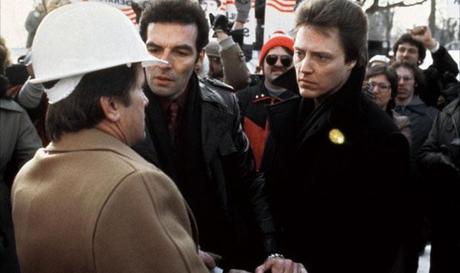
The two plots finally collide when a chance encounter at a rally leads Johnny to have a vision of Stillson piously launching nukes at our enemies because he believes it is God's will. What does one do, really, when they shake the hand of the man who will someday start World War III?
More supernatural drama and tragic romance than straight horror and thus a bit of a departure for King, the book was an instant hit thus setting the stage for a competitive bidding situation over the film rights. A typically protracted Hollywood development period ensued, with multiple producers, directors, and screenwriters cycling through. King took a crack at the script - he tried to refashion the story as something akin to a slasher focused on the Castle Rock killer - but his ideas were ignored. At producer Dino De Laurentis's request, a Russian author was given a shot at the script, but his draft went unread by almost everyone.
Cronenberg and King go together like a bowl of ice-cold gazpacho and a vanilla ice cream cone with sprinkles on top, or so you'd think
David Cronenberg - who had been contacted earlier in the process based off the strength of his 1979 film The Brood but was passed over in favor of Stanley Singin' in the Rain Dolen - ultimately came to the project through a chance meeting with producer Debra Hill. The pair reportedly ran into each other outside of John Landis' office on the Universal lot, and she hired him despite De Laurentis' reservations. For his part, Cronenberg had just wrapped the very demanding Videodrome production and liked the idea of jumping onto someone else's project, one he didn't have to write and develop on his own. King's novel certainly spoke to the post-Watergate moral decay in America, which appealed to Cronenberg, but he wasn't satisfied with any of the scripts they had.
"Stephen King's own script was terrible," the director is quoted as saying in the book Cronenberg on Cronenberg. "It was not only bad as a script, it was the kind of script that his fans would have torn me apart for doing; they would have seen me as the one who destroyed his work. It was basically a really ugly, unpleasant slasher script."
So, screenwriter Jeffrey Boam, Cronenberg and Hill locked themselves into a room for three days to rewrite the script, ultimately choosing to strictly focus on Johnny as the protagonist and save Stillson for the second half of the story.
As Cronenberg told Starburst magazine while promoting the film, "We had to 'reinvent' the book, condense it without worrying about being faithful to it in any literary, bookish way. Still, I think we have been faithful in terms of sustaining the book's tone."
This was a new experience for Cronenberg. All of his films to that point had been originals. This was his first adaptation, and while he was no stranger to stories about isolated protagonists he was definitely entering new creative terrain with The Dead Zone 's tragic romance, the reluctant hero Johnny Smith (Christopher Walken before he'd slipped into caricature) cursed by circumstance and his ex-fiance, Sarah Bracknell (played to perfection by Brooke Adams), a decent woman hopelessly torn between past and present.
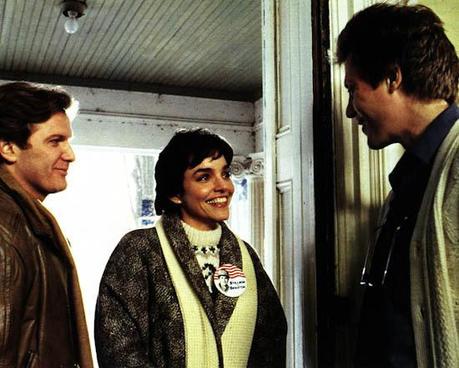
These archetypical characters are far too incorruptible to be in a normal Croneberg movie. You can't, for example, imagine Johnny Smith and Max Renn (James Woods' Videodrome protagonist) hanging out together even though they both ultimately turn into conspiracy-obsessed assassins wholly confident that what they think is happening or will happen in the world is actually true.
"King's material is different from mine," Cronenberg later acknowledged. "King's characters are usually very simple, open and honest, and the characters that I write are generally none of these things. They are urbane, sophisticated, and complex-if not twisted. I'm more comfortable in the dark corners."
To make the movie, Cronenberg was obviously willing to operate outside his comfort zone, but he would have preferred to do so while also continuing his streak of working with a primarily Canadian cast, such as recruiting frequent collaborator Nicholas Campbell to play Johnny. In this case, however, Cronenberg was largely overruled, forced by De Laurentis and others to hire better knowns like Tom Skerritt (as Sheriff Bannerman), Martin Sheen (as a cartoonish, yet still believable Stillson), Walken, and Adams. (Campbell had to settle for playing Frank Dodd, the Castle Rock Killer.)
However, while the tone of the story challenged Cronenberg to stip away his signature emotional iciness he made up for it with literal iciness. There's a lot of snow in the movie, is what I'm trying to say. Poor Johnny wakes up to a neverending winter. It's Johnny Smith's terrible, horrible, no good, very bad winter
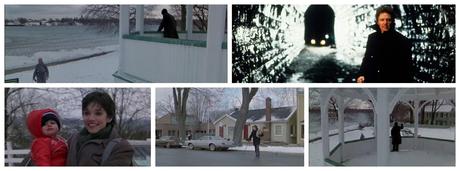 This is all beautifully captured by longtime Cronenberg collaborator Mark Irwin, the same cinematographer who later shoot The Fly, Scream, and, oddly, The Farrelly Brothers' first four movies.
This is all beautifully captured by longtime Cronenberg collaborator Mark Irwin, the same cinematographer who later shoot The Fly, Scream, and, oddly, The Farrelly Brothers' first four movies. Where I struggle with it is how episodic it feels. By delaying the Stillson reveal until much later in the story, the story plays out as a series of repetitive incidents where Johnny tries to retreat from the world but invariably gets a vision which pulls him back in. He graduates from saving a kid from a burning house to catching a serial killer, an experience which sends him back to the hospital and sees Sheriff Bannerman exit the story entirely. He then saves a kid from drowning and, finally, tries to avert nuclear Armageddon, though his jump from meeting Stillson to attempting to kill him happens with astonishing swiftness.
Of course, this call to action despite a preference for a secluded, simple life is exactly the thematic point of the story, positioning Johnny as an everyman who ultimately has to learn to accept and cope with what fate has in store for him. That doesn't mean I entirely enjoy going on that journey with Johnny, even if he is played by prime Christopher "The ice is gonna break!' Walken.
Would It Work as a 10-Episode Netflix Series?
One sees how this potential for a series of "Johnny has new vision, Johnny saves someone, rinse, repeat" episodes later led to a long-running TV series, and that's probably where I struggle the most with The Dead Zone movie. As with Escape from New York, I did this in the wrong order. I watched the Dead Zone show back when it was originally airing, and while Anthony Michael Hall is certainly no Christopher Walken his Dead Zone - launched on the USA cable channel in the summer of 2002, one month before the premiere of Monk on the same network - led to a decade plus run of shows about psychic detectives. Heck, after The Dead Zone there came not one but two different shows - Psych, The Mentalist - about fake psychic detectives
Did you ever hear the one about that time Johnny Smith, Shawn Spencer, and Monk walked into a restaurant together?To watch The Dead Zone show now is to step back into TV history and see how much has changed in just less than two decades. It is truly an old-fashioned procedural with nakedly transparent Canada-for-America doubling and no exact rush to get where it's going. The Castle Rock Killer storyline is over by the end of the pilot, paving the way for a six-year run where Johnny only ever seems to truly care about the Stillson business at the end or beginning of every season. In-between, he has bank robberies to thwart, love interests to cycle through, and Brat Pack actors to reunite with for ratings stunts.
But due to the need to stretch the story indefinitely showrunner Michael Piller gifted Johnny with a best friend/physical therapist to act as a sounding board, a wealthy father figure to free him of any need to actually get a job, and the readymade soap opera of both a love triangle (between Johnny, Sarah, and Sheriff Bannerman) and baby drama (Sarah's son is actually Johnny's, but the poor kid doesn't know that until halfway through the show's run). While not all of these choices proved successful, they at least allowed the story to breathe more than it ever had a chance to with Cronenberg's rather concise 103-minute movie.
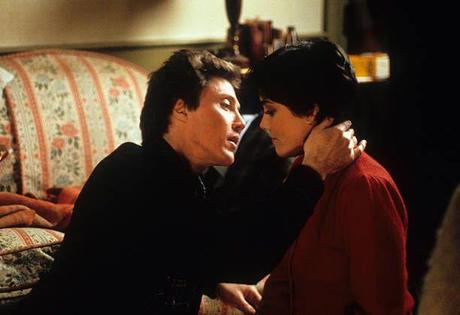
The Dead Zone film, for example, is at its most successful for me when Johnny and Sarah reconnect and finally consummate their relationship, pulling him back from the brink of despair and further coloring the tragedy of everything he lost due to his accident. But there is so little screen time for Sarah in general that when she pops up in the second half as a Greg Stillson supporter and campaign worker it rings more as an obvious plot device - a way to build a bridge between Johnny and Stillson - than a character-motivated turn of events.
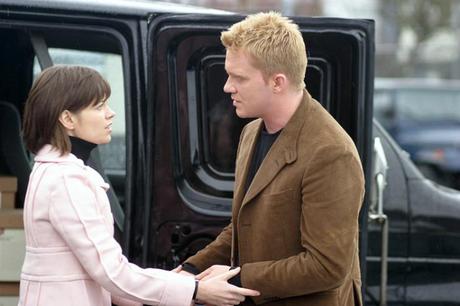
The Sarah of the show, played by DS9 's Nicole De Bour, is at least a full character who gets multiple showcase episodes, such as one where Johnny gets visions of what her life was like while he was in the coma, so many desperate nights spent sleeping next to his hospital bed.
It is, of course, patently unfair to pit a film against a TV series. They are two completely different mediums serving different creative masters. However, I mention all of this to explain why The Dead Zone film just didn't click with me. I recognize the great Walken performance and excellent Cronenberg direction, but I struggle to disentangle it from the TV show. The two properties co-exist and ultimately compliment one another.
The added length of the series allowed it to explore many of the book's subplots and backstories - such as a brain tumor possibly being the underlying cause of Johnny's visions - which the film had to drop for time, but the vagaries of TV ratings and network decisions means the show was canceled before building to a proper series finale. It remains a story without an ending. The film, at least, has one of those. It's okay to like both things, the show and the film, but if there had never been a TV show I think I still would have walked away from the movie thinking there was still so much story to be told from that premise.
Next Time:
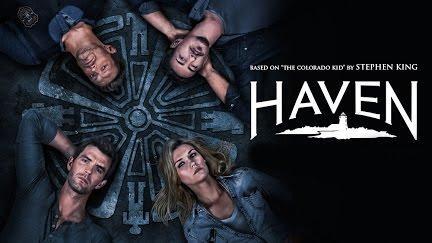
SyFy somehow squeezed 5 seasons out of a 184-page Stephen King pulp-noir homage which had no real ending. The show, of course, has almost nothing in common with the book. I watched it anyway. I have some thoughts.
Sources: Hollywood's Stephen King, Creepshows: The Illustrated Stephen King Movie Guide, SciFiNow Magazine #162, Stephen King Films FAQ
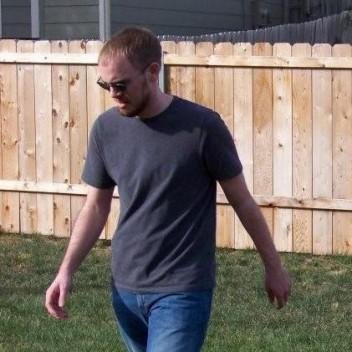
Grew up obsessing over movies and TV shows. Worked in a video store. Minored in film at college because my college didn't offer a film major. Worked in academia for a while. Have been freelance writing and running this blog since 2013. View all posts by Kelly Konda

